Resource Library
Carolinas Rehabilitation Resources

Within Your Reach Winter 2021 Newsletter
Learn more about our framework to appeal Medicare Advantage denials, see the latest of our new rehabilitation hospital and more.

Within Your Reach Fall 2020 Newsletter
2020 has been a challenging year, but our commitment to providing the highest level of rehabilitative care to our patients has remained constant. Read about our soon-to-open state-of-the-art rehabilitation hospital, latest accomplishments and more.

A cost-effective way to prevent pulmonary embolism
Venous thromboembolism (VTE) frequently strikes patients during inpatient rehabilitation and can lead to life-threatening pulmonary embolisms. But there are no standard guidelines about how – or when – to screen for VTE. That’s why we investigated the benefits of making Doppler ultrasound part of the admission process and found that it reduces the risk of pulmonary embolism, shortens rehab stays and makes acute care readmissions less likely. Show/hide full abstract
Discover how routine Doppler screening can help your patients

New clues on why exercise promotes neuroplasticity
It has long been suspected that brain-derived neurotrophic factor (BDNF) may help Parkinson’s disease (PD) patients recover motor skills, but no one examined whether BDNF changes were consistent across human PD studies. Here at Carolinas Rehabilitation, our physical medicine and rehabilitation research team solved this problem by publishing the first-ever meta-analysis of neurotrophin release during exercise in people with PD. Show/hide full abstract

See what a top rehab program can offer your patients
For almost 70 years, Carolinas Rehabilitation has provided the highest quality care to patients with the greatest functional and medical needs. And with a network that includes more than 600 board-certified therapists, 5 inpatient hospitals and 18 outpatient locations, our care is never far from your patients. Show/hide full abstract

Inpatient rehab: Effective, medically supervised – and affordable
Cancer patients are surviving for longer than ever – and grappling with physical, psychological and cognitive issues that need rehabilitative care. At Carolinas Rehabilitation, we’re embracing inpatient rehabilitation to help these patients continue post-acute cancer treatment and regain the skills to lead happy, functional lives. Show/hide full abstract

Traumatic Brain Injury Forum Hosted by Carolinas Rehabilitation
The 2018 Traumatic Brain Injury Model System Leadership Forum, hosted by Carolinas Rehabilitation, focused on leading-edge research in a variety of areas related to traumatic brain injury.

Shining a Light on Depression Among African American Stroke Survivors
Stroke disproportionately affects African Americans in many ways, but the impact of poststroke depression (PSD) has been unclear. This first-ever study gives us a better understanding of the prevalence of PSD among African Americans and its effect on recovery. Show/hide full abstract

Clarifying the Link Between Traumatic Brain Injury and Suicidality
Physicians treating traumatic brain injury (TBI) need to be aware of patients with elevated levels of suicidal thoughts. But severe extracranial injuries may pose an even greater risk than TBI for increased suicidal ideation. Explore the research behind these findings. Show/hide full abstract

A Game-Changing Method for Identifying Parkinson's Disease
Identifying people potentially at risk for developing Parkinson’s disease may now be possible even years before symptoms begin. The clue is found in patients’ saliva. Show/hide full abstract

How Does Carolinas Rehabilitation Change Patient's Lives?

EQUADR SM Continues to Drive Improvements in Rehab Care
National quality benchmark database allows peers to share best practices.

Carolinas Rehabilitation – A New Clue to Identifying Parkinson’s Patients
Watch Dr. Mark Hirsch, director of the Carolinas Department of Physical Medicine and Rehabilitation Core Laboratory, discuss how the clue to early diagnosis of Parkinson’s disease is found in patients’ saliva.

Carolinas Rehabilitation – Shining a Light on Poststroke Depression in African Americans
Watch Dr. Vu Nguyen, vice chair of academics and residency director of Physical Medicine and Rehabilitation for Carolinas Rehabilitation, discuss this first-ever study of the prevalence of poststroke depression among African Americans and its effect on recovery. Show/hide full abstract
Levine Cancer Resources

Report: Innovating the Next Generation of Treatments for Blood Cancers
LCI shared advances in understanding and treating hematological cancers at the 2022 American Society of Hematology Annual Meeting. Explore our latest research.

Esophageal Cancer Care
Learn about the latest innovations that are dramatically improving esophageal cancer patient outcomes.

OncLive Strategic Alliance Partner
Levine Cancer is a proud member of the OncLive Strategic Alliance Partners program, a collaboration that brings oncology professionals the latest insights in cancer care.

More intense isn’t necessarily better when it comes to non-Hodgkin lymphoma treatments
Conditioning regimens of different intensities may be used in stem cell treatment of non-Hodgkin lymphoma – but more intense regimens may not be best for the patient.

An Innovative Nutrition Program Helps Cancer Patients Stay Strong
Up to 80% of cancer patients suffer from malnutrition. At Levine Cancer, we’ve launched an innovative malnutrition screening and treatment program to help patients stay stronger, recover faster and live healthier. Show/hide full abstract

Transoral Robotic Surgery (TORS)
In the past, chemotherapy, radiation and invasive surgery were the only options for head and neck cancer treatment. Fortunately, transoral robotic surgery (TORS) is turning the tide.

Meet the first radioactive drug for neuroendocrine tumors
An innovative drug helped 65% of patients with advanced neuroendocrine tumors reach at least 20 months of progression-free survival.

3 Ways We’re Transforming Sickle Cell Care
From haploidentical transplants to novel pain regimens that reduce opioid use, we’re developing ways to help more patients conquer sickle cell.

3 breakthroughs that could transform hematology care, from Charlotte to Africa
Helping patients beat lymphoma, sickle cell and multiple myeloma

4 clinical trials = progress against recurrent gynecologic cancers
Immunotherapies might finally extend survival

A ‘universally fatal’ glioma? Think again.
When it comes to brain tumors, H3 K27M mutant glioma is the worst of the worst. But an experimental drug, called ONC201, is showing unprecedented results. Find out how this groundbreaking therapy kills tumors

Your Patient Beat Cancer. What’s Next?
Cancer and its treatments can lead to long-term side effects like osteoporosis, cardiovascular disease and increased risk of another cancer. Fortunately, genetic testing, screenings and follow-up care can help survivors predict, prevent and overcome many of their unique medical issues.

Levine Cancer Awarded $14 Million for Sickle Cell Care Improvement Effort
Levine Cancer’s sickle cell disease enterprise will spearhead two new initiatives to bolster sickle cell outcomes.

The Future of Multiple Myeloma Treatment
Monoclonal antibodies are delivering a powerful new option against multiple myeloma, and LCI is bringing this new treatment option, as well as CAR T-cell therapies, to patients.

Skin Cancer: New Immunotherapies Expand Patients’ Options
Immunotherapy has revolutionized treatment for melanoma of the skin – and paved the way for using this approach against other, harder-to-treat skin cancers.

For Lung Cancer, Precision Medicine is Changing the Game
The combination of molecular testing and targeted drugs is significantly extending survival for many lung cancer patients.

Immunotherapy: New Options for Breast Cancer Patients
Recent studies suggest the programmed death ligand-1 inhibitor (an immunotherapy drug) is effective in some breast cancer patients. Through clinical trials, we’re delivering these to patients who might be running out of options.

CAR T-cell Therapy for Lymphoma
Hailed as oncology’s “Advance of the Year” by the American Society of Clinical Oncology, CAR T-cell therapy is offering hope for cancers formerly considered untreatable. As one of a few sites nationally participating in Juno 017001, we're already seeing promising results.

Colon Cancer: How Much Adjuvant Chemotherapy is Enough?
National guidelines were updated to allow for a shorter duration of adjuvant chemotherapy for Stage III colon cancer. What duration is right for your patient?

Levine Cancer receives Planetree recognition
Carolinas HealthCare System's Levine Cancer is the first cancer network named a Planetree Patient-Centered Organization. Learn how we earned it.
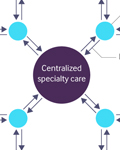
Redesigning the Delivery of Specialty Care Within Newly Formed Hospital Networks
This article briefly reviews the frequently described approach of centralizing specialty services and then uses the story of Atrium Health to describe an emerging alternative strategy of decentralizing specialty services. Show/hide full abstract

Progress in Plasma Cell Disorders
The management of multiple myeloma (MM) has seen a drastic change over the last 15 years. Learn more about the progress Levine Cancer has made.

Chronic neutrophilic leukemia in a child with aCSF3RT618I germ line mutation
Chronic neutrophilic leukemia (CNL) is a rare myeloproliferativeneoplasm characterized by sustained elevation of neutrophil count,splenomegaly, and poor prognosis. Activating mutations in the colony-stimulating factor 3 receptor (CSF3R), also known as the granulocytecolony-stimulating factor (G-CSF) receptor, have recently been identified in 80% of patients studied with CNL. Show/hide full abstract
.jpg?rev=82371c524f374554af687a42e2df91f7&hash=820C4AB73142C2FE5C50178EC40E9A1A)
Turning the Tables on Advanced Bladder Cancer
The FDA gave “breakthrough” designation to two new therapies for metastatic urothelial cancer, and Levine Cancer offers both, plus a novel agent that isn’t available anywhere else.
Levine Children's Hospital Resources

With World-Class Care and Outcomes, Kids Can Be Kids
At Levine Children’s Hospital, our patients are children first. In this book, discover how our life-changing care and capabilities are making better futures for children and their families.
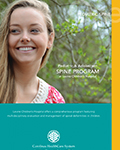
Pediatric Heart Care
Caring for minor heart murmurs to complex heart defects, our multidisciplinary team of physicians provides seamless cardiology carefrom before birth through adulthood. We specialize in neonatal cardiac surgery for newborns, pediatric cardiac surgery, heart transplantation and adult congenital surgery. And our team uses the most advanced technology to evaluate, diagnose, treat and manage your patient's heart condition. Show/hide full abstract

Atrium Health Pediatric Surgery
At Atrium Health, our pediatric surgeons utilize the latest in minimally invasive and one-stage techniques, caring for newborns, children and adolescents. Practicing at Levine Children's Hospital in Charlotte and Jeff Gordon Children's Hospital in Concord, our pediatric surgeons provide expertise in fetal and neonatal care, trauma and pediatric oncology. Show/hide full abstract
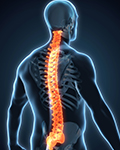
Pediatric and Adolescent Spine Program
Levine Children's Hospital offers a comprehensive program featuring multidisciplinary evaluation and management of spinal deformities in children.

Going the extra mile for Kyler's new heart
Seven-year-old Kyler Bebber's heart had already given out three times and his family and doctors were very concerned that he may have a fourth sudden cardiac arrest.
Musculoskeletal Institute Resources

2021 Highlights Report From MSKI
Atrium Health Musculoskeletal Institute (MSKI) continues to advance its vision of becoming the first and best choice for musculoskeletal care in the Southeast. View our latest report to see our progress in clinical care, education and research.

Creating a New Kind of Academic Musculoskeletal Institute
Claude “T.” Moorman III, MD, recently became president of our new Musculoskeletal Institute, drawn by the chance to help redefine academic musculoskeletal care.

An Inside Look at Our 2019 Highlights
Atrium Health Musculoskeletal Institute, we’re pushing the limits to redefine musculoskeletal care, in collaboration with Carolina Neurosurgery and Spine Associates and OrthoCarolina. In this report, you’ll learn about our expertise, innovation, academic strength and more.

2020 Highlights Report From MSKI
Atrium Health Musculoskeletal Institute (MSKI) continues to advance its vision of becoming the first and best choice for musculoskeletal care in the Southeast. View our latest report to see our progress in clinical care, education and research.

Atrium Health Orthopaedic Researchers Develop Digital Tools to Address Opioid Crisis
Researchers at Atrium Health Musculoskeletal Institute’s Department of Orthopaedic Surgery and Atrium Health Carolinas Medical Center have developed electronic health record-integrated digital tools.
Neurosciences Institute Resources

How Atrium Health Carolinas Medical Center's iMRI Transforms Neurosurgery
Intraoperative MRI (iMRI) is making certain brain surgeries more precise and effective, by enabling neurosurgeons to capture key images and adapt in real time.

ARISE trial aims to reduce intractable seizures
The novel drug is the first to target multiple receptors.

How to treat 66% of stroke patients in 45 minutes or less
In 2016, Atrium Health launched the Code Stroke Registry – a patient information repository that allows us to harness “big data” to pinpoint inefficiencies, optimize protocols and improve care

From Spine Surgery to Epilepsy Diagnosis, Even the Best Care Can Get Better
Our Neurosciences Institute is on a mission to make care more precise. That’s why we’re using an innovative robotic-assisted surgical system and neurodiagnostic technology to improve accuracy and patient outcomes. See how these technologies transform care. Show/hide full abstract

Neurosciences Institute: Shaping the Future of Neuroscience Care
Our Neurosciences Institute offers the most comprehensive care for brain, spine and nervous system disorders in the region – but our leadership transcends geographical borders. Through cutting-edge research, the latest treatments and technologies, and renowned specialty programs, we’re defining the future of neuroscience care. Explore our innovative, quality-driven approach. Show/hide full abstract

Skull Base Tumors: A Minimally Invasive Approach Transforms Care
Atrium Health’s skull base surgery experts are using minimally invasive techniques to give patients the best possible outcomes – with fewer risks and far shorter recoveries than with cranial surgery. Show/hide full abstract

How can you prevent overtriage for stroke?
New guidelines extend the treatment window for mechanical thrombectomy to 24 hours for some patients.

Groundbreaking stroke pilot aims to reduce door-to-needle time by 30 minutes
Dr. Jeffrey Bodle has helped develop an innovative pilot program that connects patients in ambulances to neurohospitalists in the ER via virtual technology.

Man Walks After Neurosurgical Procedure
Neurosurgeon, Dr. McGirt and his team used a specialized, freehand technique on a paralyzed man's spine to allow him to walk again.

New Advances Offer Fresh Hope to Patients with Refractory Epilepsy

Early Results in Study for Complete Spinal Cord Injury
Patients with an acute, complete (AIS A), thoracic traumatic spinal cord injury have a surgical intervention that may help facilitate neurologic recovery.

Today’s CT perfusion scanning technologies show increasing promise for individualizing acute ischemic stroke care.

A New Way to Track Migraines
Typically, patients track their migraines and severe headaches via journals; now there’s an intuitive app for that.
LISTEN HERE
ITUNES
GOOGLE PLAY
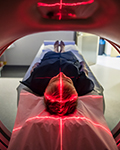
Effect of Radiosurgery Alone vs Radiosurgery With Whole Brain Radiation Therapy on Cognitive Function in Patients With 1 to 3 Brain Metastases
Whole brain radiotherapy (WBRT) significantly improves tumor control in the brain after stereotactic radiosurgery (SRS), yet because of its association with cognitive decline, its role in the treatment of patients with brain metastases remains controversial. Show/hide full abstract
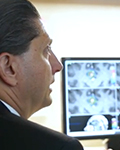
Charlotte doctors find less radiation best for treating certain brain cancers
Dr. Tony Asher and Dr. Stuart Burri, Charlotte doctors with Atrium Health, are co-authors of a new study that shows some brain cancer patients can be treated effectively with a less toxic form of radiation that produces fewer memory problems and cognitive side effects. Show/hide full abstract

Game-Changing Surgery Relieves Trigeminal Neuralgia Pain
Dr. Asher is one of the Southeast’s most experienced surgeons in treating trigeminal neuralgia.

Beyond Pituitary Tumors: Advancing Minimally Invasive Approaches in Skull Based Surgery
Learn how our high-volume, Skull Base Surgery Program is advancing minimally invasive approaches through the nose and eyebrow to improve patient outcomes in complex cases.
Sanger Heart & Vascular Institute Resources

Achieving Top Outcomes While Expanding Virtual and Value-Based Care
Sanger expanded its reputation as a national leader in 2021, by spearheading innovations that enable us to make our world-class care and outcomes even better.

Another Year of Breakthrough Heart & Vascular Care
Sanger continued achieving some of the nation’s top outcomes for heart and vascular care in 2020, while developing treatments, devices and surgery techniques that will make future care even better.

Meet the Latest Heart & Vascular Breakthroughs
Sanger’s 2019 Outcomes & Innovations Report chronicles how we achieve top outcomes while pursuing breakthrough treatments, surgical devices and techniques.

An Innovative Solution for Chronic Atrial Fibrillation (AF)
Hybrid AF ablation combines surgery and catheterization to solve persistent AF when standard treatments fail.

Minimally Invasive Carotid Procedure Reduces Stroke Risk and Recovery Time
At Sanger Heart & Vascular Institute we’ve performed over 130 TCAR procedures, while limiting the stroke risk to approximately 1%.

Two Options for When Heart Failure Keeps Getting Worse
ARNI can be more effective than ACE inhibitors, and the latest LVADs can help patients get back to traveling and playing golf.

An Inside Look at Sanger’s 2018 Innovations and Outcomes
Being a leader means more than delivering world-class cardiovascular care – it means raising the bar by improving outcomes, developing innovative techniques and pursuing breakthrough treatments, with excellent patient satisfaction. Our latest outcomes report details why Sanger Heart & Vascular Institute is one of the nation’s top centers for everything from minimally invasive procedures to cardiothoracic surgery to aortic disease treatment. Show/hide full abstract

Finally, A Minimally Invasive Solution for Secondary MR
After medication fails, heart failure patients who develop secondary mitral regurgitation traditionally have limited options. But the tide is turning thanks to MitraClip, a transcatheter device that stops valve leakage by clipping the leaflets together.

We’ve hired 19 new subspecialists to raise the bar
Heart and vascular care are becoming ever-more specialized – and so is Sanger Heart & Vascular Institute.

Rare aortic dissection case during labor calls for dual surgery
When a 39-year-old woman in active labor presented to the emergency room with acute aortic dissection, the skilled team at Sanger Heart & Vascular Institute sprang into action to save two lives.

1 in 3 afib patients can’t take anticoagulants
An innovative device is here to help prevent strokes

It’s Time to Change Your Thinking About Aortic Valve Replacement
For patients under 60 needing a long-term fix, valve repair has emerged as a better, more durable option.

How to Reduce Cholesterol When Statins Don’t Work
The ODYSSEY Outcomes trial showed that a new class of drug called PCSK9 inhibitors can reduce cholesterol in high-risk patients by half.

Improving Treatment for Deep Vein Obstructions
Deep vein obstructions can lead to symptoms that diminish quality of life. But it can be hard to diagnose these obstructions or know when they’re different from superficial venous problems.
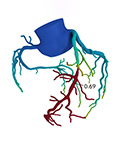
Two New Technologies Transforming Chest Pain Evaluation
For many patients with chest pain, stress tests don’t always provide a clear diagnosis. Enter two newer noninvasive technologies that are changing the game.

Stabilizing the Sternum in High-risk Patients
Dr. Madjarov and the Sanger Heart & Vascular Institute team developed a groundbreaking device that uses polymer plates to stabilize the sternum longitudinally, and it’s already improving outcomes and helping patients live longer.

First-in-World Stent Implantation to Treat Nonthrombotic Iliac Vein Lesion
Sanger Heart & Vascular Institute enrolled and treated the first patient in the investigational device exemption study for a venous self-expanding stent system.

An Inside Look at Outcomes and Innovation
Being a leader means more than delivering world-class cardiovascular care – it means raising the bar by improving outcomes, developing innovative techniques and pursuing breakthrough treatments. Our latest outcomes report details why Sanger Heart & Vascular Institute is one of the nation’s top centers for everything from heart transplant to cardiothoracic surgery to aortic disease treatment. Show/hide full abstract

The Latest Trials for Mitral Regurgitation – Available Right Here
You may have heard of the FDA-approved MitraClip, but you might not know about some brand-new trials bringing even more treatment options to your patients with severe mitral regurgitation (MR). Learn the latest on MR. Show/hide full abstract

PFO and Cryptogenic Stroke: New Clarity on Reducing Risk
After years of debate, results of three trials confirm the benefit of closing a patent foramen ovale (PFO) in selected stroke patients in order to prevent a recurrent stroke. Learn the latest on PFO and stroke.

Management of Subclavian Vein Thrombosis With Mechanical Thrombectomy
Read a case description of a young athlete treated with mechanical thrombectomy and low-dose thrombolytics in a single session.

Why Build an Aortic Center?
Learn more about the goals, requirements and numerous benefits of developing an aortic center.

Indigo® Mechanical Thrombectomy System for Thromboembolic Disease
Hear experts within the endovascular community share their experiences with and perspectives on clot management protocols and the risks and benefits of the various available treatment options. Show/hide full abstract

A Complete Embolization System
As data on coil embolization become more robust, so must the tools and technology we use. Learn about new devices that are moving care forward.

Examining EVAR’s Role in Rupture Care
In recent years, our ability to treat abdominal aortic aneurysms using endovascular repair (EVAR) has improved. Learn more about the advancements clinicians have made in the field.

Video: TAVR vs Surgery: The Latest Research
Compared to traditional surgery, TAVR is emerging as a preferred therapy for intermediate-risk patients with severe aortic stenosis. Hear Dr. Hadley Wilson outline the latest studies.

Transcatheter Aortic Valve Replacement (TAVR): Is It for Everyone?
Wondering if TAVR is a treatment option for your aortic stenosis patient? Learn more about who's eligible for TAVR therapy.

Inside Our Structural Heart Program
The physicians at Sanger Heart & Vascular Institute offer complete, advanced care for every structural and valve condition. From minimally invasive approaches to advanced catheter-based procedures like TAVR, explore our full range of heart valve disease care.

Inside Our Advanced Heart Failure & Transplant Program
With top outcomes and the region's only heart transplant center, Sanger Heart & Vascular Institute's heart failure and transplant program is among the best in the nation. Learn more about our expert team and our specialized care.

Inside Our Vascular Program
From prevention to diagnosis to treatment, Sanger Heart & Vascular Institute's vascular medicine physicians offer the full range of specialized care. Explore our breakthrough care for treating aortic aneurysms – and much more.

Transforming Heart Failure into Heart Success: Innovation & Outcomes
Get a closer look at Sanger Heart & Vascular Institute's nation-leading heart transplant care and outcomes.

At a Glance: Vascular Surgery & Medicine
See the outcomes and offerings of one of the region's highest-volume vascular centers.

Inside our Advanced Heart Rhythm Program
With a dedicated Center for Atrial Fibrillation and one of the nation's largest device clinics, our Advanced Heart Rhythm Program treats a wide array of arrhhythmias with epxerience and expertise. Explore our specialized care.

At a Glance: Advanced Heart Rhythm Program
Get a quick look at our progam's care, from our forward-thinking treatments to our exceptional outcomes.
.jpg?h=125&w=97&rev=04c00fd05ff241bdbf0d0e20c3108215&hash=A5464F09E4BD0DFB3A32DEB6A3C1FCF9)
At a Glance: Center for Aortic Disease
From a first-in-the-world aortic aneurysm treatment to nation-leading aortic repair volumes, get a look at our leading care.

At a Glance: Center for Advanced Heart Valve Therapies
With a leading role in clinical trials and hundreds of TAVR cases under our belt, we're national leaders in treating valve and structural heart disease. Learn more about our unmatched expertise and outcomes.

RENEW Clinical Trial Eases Chest Pain
Learn more about the stem cell therapy study that's giving heart disease patients a better quality of life.

A Dangerous Blood Clot Almost Took Her Life – Here’s How ‘Code PE’ Saved It
Go inside Code PE, the special protocol developed by our doctors and staff to handle critical cases of pulmonary embolism.

Heart Pumps: They’ve Advanced More Than You Think
Think heart pumps like the LVAD are still stuck in the past, causing major interruptions to your patient's everyday life? Think again.

Cardiac Leads: When Should They Be Removed?
Patients are living longer with ICDs and pacemakers than ever before – which means their devices and leads are aging, too. Learn the most up-to-date indications for cardiac lead removal.

A New Treatment Option for Type B Aortic Dissection
Learn more about TEVAR (thoracic endovascular aortic repair), a minimally invasive alternative to open surgery.

New Advances in Mitral Valve Disease Treatment
We’ve seen a surge of innovation for less invasive mitral valve repair and replacement technology. But how do you know what’s right for your patient?

Atrial Fibrillation: Medical Therapy or Ablation?
Your Afib patient is on medical therapy, but you wonder: Is that really their best option? We’re giving you the top 6 answers you need to help you decide when ablation is best.

Advanced Heart Failure Care: When Should You Refer?
Patients treated by advanced heart failure programs have fewer complications, shorter hospital stays and better odds of a good outcome. But when is the right time to send your patients for specialized care?
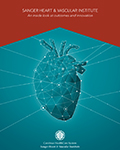
Sanger Heart & Vascular Institute: An Inside Look at Outcomes and Innovation
For more than 50 years, Atrium Health's Sanger Heart & Vascular Institute has been committed to delivering world-class cardiovascular care and advancing new treatments. Today, that dedication has helped place us among the nation's best. Explore how our patient outcomes, innovative experts and breadth of specialties set us apart. Show/hide full abstract

B. Hadley Wilson, MD, FACC, Elected Chair of ACC Board of Governors
B. Hadley Wilson, MD, FACC, has been elected chair of the American College of Cardiology Board of Governors and secretary of the Board of Trustees, the main governing body of the ACC, for 2017-2018. His term begins today as the ACC's 66th Annual Scientific Session comes to a close in Washington. Show/hide full abstract

Results of the Valiant Mona LSA early feasibility study for descending thoracic aneurysms.
Participating in the United States Food and Drug Administration's new Innovation Pathway, this first-in-human, early feasibility study evaluates early clinical experience of the Valiant Mona LSA Stent Graft System in patients with DTAs where the proximal landing zone necessitates LSA coverage. Show/hide full abstract
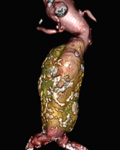
Considerations Beyond Anatomy to Best Manage Aortic Disease: The Benefits of EndoAnchors
Dr Arko discusses his approach to treating patients and how EndoAnchors fit into his treatment algorithm.
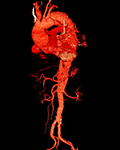
Building a Comprehensive Aortic Center
Building a comprehensive aortic center presents a unique set of challenges to the delivery of cardiovascular care. Improving that quality of care should be the main goal of any comprehensive aortic program. Developing your institution's capabilities and reach is possible with a commitment to more efficient processes, improved data tracking and measurement, and training more effective teams. Show/hide full abstract
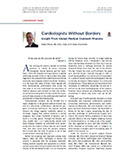
Cardiologists Without Borders
Through the International Medical Outreach program, Sanger Heart & Vascular Institute is collaborating across borders to foster sustainable cardiovascular care and capabilities overseas.

Atrial Fibrillation: How Standardization and a Patient-Centered Approach Improve Outcomes
Learn about Atrium Health Sanger Heart & Vascular Institute’s Atrial Fibrillation Center of Excellence that’s decreasing hospital admission rates, length of stay and healthcare costs for this rapidly growing chronic disease.
Surgery Resources

World’s First Artificial Intelligence Tool for Predicting Hernia Surgery Outcomes
Hernia specialists at Atrium Health Carolinas Medical Center develop an easy-to-use preoperative tool that could prevent additional hernia surgeries or complications.

How to Safely Restart Metabolic and Bariatric Surgery
We developed an innovative, tiered approach for prioritizing patients, and safely restarting metabolic and bariatric surgery, after the COVID-19 peak has passed.
.jpg?rev=8959ca134cfb4d21a16d9b49016c0c65&hash=E61B367824156164296DFBD296209600)
Making the Case for Virtual Post-Op Care
Learn about the first noninferiority randomized controlled study of virtual post-op care

Leading the Way in Advanced HPB Surgery
As leaders in the field and one of the most experienced HPB team in the nation, Atrium Health's HPB surgeons are nationally and internationally regarded for their advanced minimally invasive techniques and are often asked to teach surgeons and fellows from around the world. Show/hide full abstract

5 Ways We’re Elevating Care for Critically Ill and Injured Surgical Patients
We recently recruited one of the nation’s top experts in trauma, surgical critical care and emergency surgery, Addison May, MD, MBA, FACS, to lead our world-class acute care surgery team and help it raise the bar even higher. Show/hide full abstract

Innovative Ventral Hernia Repair: A Complex Case Study
Last year, a 49-year-old male had a motorcycle accident that left him in a controlled coma for 5.5 weeks with severe injuries and, eventually, a large ventral hernia and ileostomy.

Building a World-Class Head and Neck Program
When Zvonimir Milas, MD, FACS, launched our head and neck cancer program in 2013, he expected its multidisciplinary approach to win attention from physicians and patients. But even Dr. Milas was surprised at how quickly the program became one of the region’s busiest.

Improving Outcomes Via Enhanced Recovery After Surgery (ERAS)
At Atrium Health, we’re at the forefront of using Enhanced Recovery After Surgery (ERAS) to improve surgical care and outcomes.

Extending the Shelf Life of Platelets
As a surgeon, Susan Evans, MD, has seen first-hand how donated platelets can stop bleeding and save patients’ lives after car accidents, gunshot wounds or other traumas. She also knows these platelets can be in scarce supply.
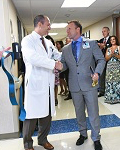
CMC's HPB Unit Earns a First in the U.S.
This summer, CMC's Hepato-Pancreato-Biliary Surgery Unit (HPB) was awarded a certificate for implementing an Enhanced Recovery after Surgery (ERAS) program, marking it the first and only U.S. center that has implemented specific guidelines that help patients recover quicker, receive more communications from their care team, and improve pain management, among other initiatives. Show/hide full abstract

New Option for Partial Knee Replacement Now Available
This September, we will be launching an advanced robotics-assisted technology used to perform partial knee arthroplasty. This is an excellent option, new to patients looking for less invasive partial knee replacement.
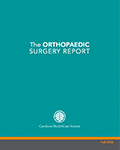
The Orthopaedic Surgery Report
Our orthopaedic subspecialists and their support teams provide world-class care to our patients within one of the largest accountable healthcare systems in the country. Patient care volume was at an all-time high at Carolinas Medical Center, CMC-Mercy and across our integrated local and regional facilities, which comprise Atrium Health. Show/hide full abstract


